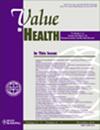欧洲联合临床健康技术评估中附加 PICOs 的影响。
IF 4.9
2区 医学
Q1 ECONOMICS
引用次数: 0
摘要
目的评估基于 EUnetHTA 21 指南的欧盟 PICO 的潜在数量,并探索更多基于证据的机会,以产生更可预测、更可行的欧盟 PICO:方法:根据 EUnetHTA 21 提出的指南,利用最近两种类似适应症药物的 HTA 公开报告,得出了两种未来假定药物在一线非小细胞肺癌 (1L NSCLC) 和三线多发性骨髓瘤 (3L MM) 中的综合欧盟 PICO。敏感性分析评估了额外 PICO 请求的影响。对要求进行的分析数量进行了估算:对于 1L NSCLC 和 3L MM,分别有 6 个和 9 个欧盟成员国 (MS) 发布了 HTA 报告。PICO 合并后,1L NSCLC 和 3L MM 分别有 10 个和 16 个 PICO,如果将英格兰的 NICE 范围纳入其余 MS 的代理范围,则分别增加到 14 个和 18 个 PICO。至少需要进行 280 项和 720 项分析,随着要求增加结果测量和亚组,分析数量将呈指数增长:结论:EUnetHTA 21 概述的 PICO 方法会导致大量的分析请求和大量的资源。使用补充分析和循证方法来推导 PICO,并在整个过程中与卫生技术开发者合作,将创建一个可行的、可预测的、对欧盟影响最大的欧盟 PICO,从而产生一份及时的、高质量的评估报告,在成员国层面上更易于使用。本文章由计算机程序翻译,如有差异,请以英文原文为准。
The Impact of Additive Population(s), Intervention, Comparator(s), and Outcomes in a European Joint Clinical Health Technology Assessment
Objectives
To assess the potential number of European Union (EU) population(s), intervention, comparator(s), and outcomes (PICOs) based on European Network for Health Technology Assessment 21 (EUnetHTA 21) guidance and to explore further evidence-based opportunities to produce more predictable and workable EU PICOs.
Methods
The consolidated EU PICOs of 2 future hypothetical medicines in first-line non-small cell lung cancer (1L NSCLC) and third line multiple myeloma (3L MM) were derived using published health technology assessment reports of 2 recent medicines in similar indications based on EUnetHTA 21 proposed guidance. Sensitivity analysis assessed the impact of additional PICO requests. The number of analyses requested was estimated.
Results
In 1L NSCLC and 3L MM, 6 and 9 EU Member States (MS), respectively, had published health technology assessment reports. PICO consolidation resulted in 10 PICOs for 1L NSCLC and 16 PICOs for 3L MM, increasing to 14 and 18 PICOs, respectively, when England’s National Institute for Health and Care Excellence scope was included to proxy remaining MS. A minimum of 280 and 720 analyses would be requested, exponentially increasing as additional outcome measures and subgroups are requested.
Conclusions
The PICO approach outlined by EUnetHTA 21 results in a significant number of analysis requests and substantial resources. Use of complementary analyses alongside evidence-based methods to derive PICOs and engaging with the health technology developer throughout the process would create a workable EU PICO that is predictable and most impactful for the EU, resulting in a timely and high-quality assessment report that is more usable at a MS level.
求助全文
通过发布文献求助,成功后即可免费获取论文全文。
去求助
来源期刊

Value in Health
医学-卫生保健
CiteScore
6.90
自引率
6.70%
发文量
3064
审稿时长
3-8 weeks
期刊介绍:
Value in Health contains original research articles for pharmacoeconomics, health economics, and outcomes research (clinical, economic, and patient-reported outcomes/preference-based research), as well as conceptual and health policy articles that provide valuable information for health care decision-makers as well as the research community. As the official journal of ISPOR, Value in Health provides a forum for researchers, as well as health care decision-makers to translate outcomes research into health care decisions.
 求助内容:
求助内容: 应助结果提醒方式:
应助结果提醒方式:


